|
|
|
Sort Order |
|
|
|
Items / Page
|
|
|
|
|
|
|
| Srl | Item |
| 1 |
ID:
147314
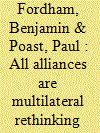

|
|
|
|
|
| Summary/Abstract |
Alliance formation is a multilateral process. The vast majority of alliance relations are created via multilateral alliances. Moreover, leaders assess the alliance as a whole, not just each prospective partner. Any alliance could have three or more members, so one must understand not just why third parties were included in multilateral alliances, but why they were excluded from bilateral alliances. Unfortunately, current research treats alliance formation as a bilateral process: it theorizes about bilateral alliances and tests hypotheses using dyadic research designs. Reconceptualizing all alliances as originating from a multilateral process reveals that a long-neglected theory, William Riker’s size principle, illuminates the role of power in alliance formation. Using k-adic data to analyze multilateral processes, we find strong support for Riker’s claim about minimum winning coalitions in world politics. Our argument and findings, by highlighting how a fundamental state behavior like alliance formation follows a multilateral process, suggest rethinking much of international relations research.
|
|
|
|
|
|
|
|
|
|
|
|
|
|
|
|
| 2 |
ID:
147315
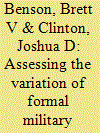

|
|
|
|
|
| Summary/Abstract |
Many critical questions involving the causes and consequences of formal military alliances are related to differences between various alliances in terms of the scope of the formal obligations, the depth of the commitment between signatories, and the potential military capacity of the alliance. Studying the causes and consequences of such variation is difficult because while we possess many indicators of various features of an alliance agreement that are thought to be related to the broader theoretical concepts of interest, it is unclear how to use the multitude of observable measures to characterize these broader underlying concepts. We show how a Bayesian measurement model can be used to provide parsimonious estimates of the scope, depth, and potential military capacity of formal military alliances signed between 1816 and 2000. We use the resulting estimates to explore some core intuitions that were previously difficult to verify regarding the formation of the formal alliance agreement, and we check the validity of the measures against known cases in alliances as well as by exploring common expectations regarding historical alliances.
|
|
|
|
|
|
|
|
|
|
|
|
|
|
|
|
| 3 |
ID:
147312
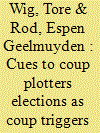

|
|
|
|
|
| Summary/Abstract |
A large proportion of coup attempts in autocracies occur in the aftermath of elections, yet little systematic research exists on the topic. Drawing on recent literature on elections in autocracies, we present an argument to explain postelection coups. While we recognize that electoral institutions have the potential to stabilize autocracies, we illustrate that the election event can spark instability when incumbents reveal electoral weakness. Electoral outcomes—in the form of vote shares and opposition reactions—are signals containing information about the strength of the opposition, and indirectly about the likelihood of a successful full-scale revolution that would compromise the privileged positions of regime elites. In these situations, coups are likely to be initiated to avoid a revolution, either by serving as concessions to the opposition or by facilitating increased repression. We perform a large-N study that supports our argument, significantly nuancing the claim that elections stabilize autocracies.
|
|
|
|
|
|
|
|
|
|
|
|
|
|
|
|
| 4 |
ID:
147313
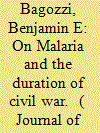

|
|
|
|
|
| Summary/Abstract |
Geographic factors such as rugged terrain and distance from capital cities are widely believed to prolong civil wars by enabling rebel groups to resist total defeat. This article argues that prevalence of malaria can similarly serve to asymmetrically enhance rebels’ defensive capabilities and thus prolong civil war. Malaria prevalence does so in three complementary ways. First, while malaria can inflict costs on both government and rebel troops, these costs are magnified for larger and denser human groups; thereby ensuring that the costs of malaria will often be higher among government troop deployments. Second, because government soldiers are rotated in and out of conflict zones whereas insurgents typically are not, the former are likely to have a higher nonimmune exposure rate than the latter, which further ensures that government forces will be more susceptible to contracting and spreading malaria. Third, malaria can also indirectly prolong civil war by helping to maintain a socio-geographic environment that is conducive to insurgency. These three complementary factors advantage rebel forces’ abilities to resist defeat by government forces and prolong civil conflicts. I empirically test these arguments by examining the duration of civil wars and find strong support for a prolonging effect of malaria on civil conflict.
|
|
|
|
|
|
|
|
|
|
|
|
|
|
|
|
| 5 |
ID:
147318
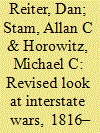

|
|
|
|
|
| Summary/Abstract |
Interstate war data are critical for many important research areas in international relations. Scholars working in these areas frequently rely on the Correlates of War (COW) interstate war data. This article analyzes the COW interstate war data version 4.0, covering the years 1816 through 2007. Using COW coding criteria, the article finds that in more than 30 percent of the ninety-five COW interstate wars, codings of at least one of the key variables—existence of the war, list of participants, initiator, and outcome—needs to be revised. This article describes a revised data set on interstate wars that incorporates these revisions. The data set includes a metric for breaking apart large, multilateral wars such as the World Wars into component wars. For each participant in multilateral wars, it provides information on exactly which states that participant fought, and specific initiation and outcome codings for that participant.
|
|
|
|
|
|
|
|
|
|
|
|
|
|
|
|
| 6 |
ID:
147317
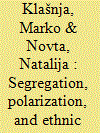

|
|
|
|
|
| Summary/Abstract |
An index of ethnic segregation conveys the extent of spatial mixing of ethnic groups, whereas an index of ethnic polarization and similar diversity measures show the overall balance between the groups. We present a game-theoretic model of conflict in which local success of one ethnic group encourages attacks by its co-ethnics in neighboring areas. Conditional on conflict breaking out, we find that for highly ethnically polarized societies, increasing ethnic segregation decreases the incidence and intensity of conflict. In contrast, in societies with low ethnic polarization, increasing segregation increases conflict. This is because segregation and polarization jointly determine the spread of conflict, an important channel that has been neglected previously. We find strong empirical support for model predictions in two very different conflicts: Hindu–Muslim riots in the 1980s and 1990s in India and the Bosnian Civil War from 1992 to 1995.
|
|
|
|
|
|
|
|
|
|
|
|
|
|
|
|
| 7 |
ID:
147316


|
|
|
|
|
| Summary/Abstract |
Democracy, human rights, and terrorism are major foreign policy issues. However, among these issues, what do the US leaders care about the most? This study assesses the degree to which Washington responds militarily to threats to democratic institutions, human rights abuses, and terrorist activity in other countries. Based on a cross-national, time-series data analysis of 164 countries for the years 1981 to 2005, this study presents empirical models that evaluate the relative importance of these issues for contemporary American foreign and security policy. It turns out that, all other things being equal, the United States is likely to engage in military campaigns for humanitarian reasons that focus on human rights protection rather than for its own security interests such as democracy promotion or terrorism reduction. This finding is extremely robust and reinforced by case illustrations that support a causal explanation for US intervention with a basic and sustained place for human rights protection.
|
|
|
|
|
|
|
|
|
|
|
|
|
|
|
|
|
|
|
|
|